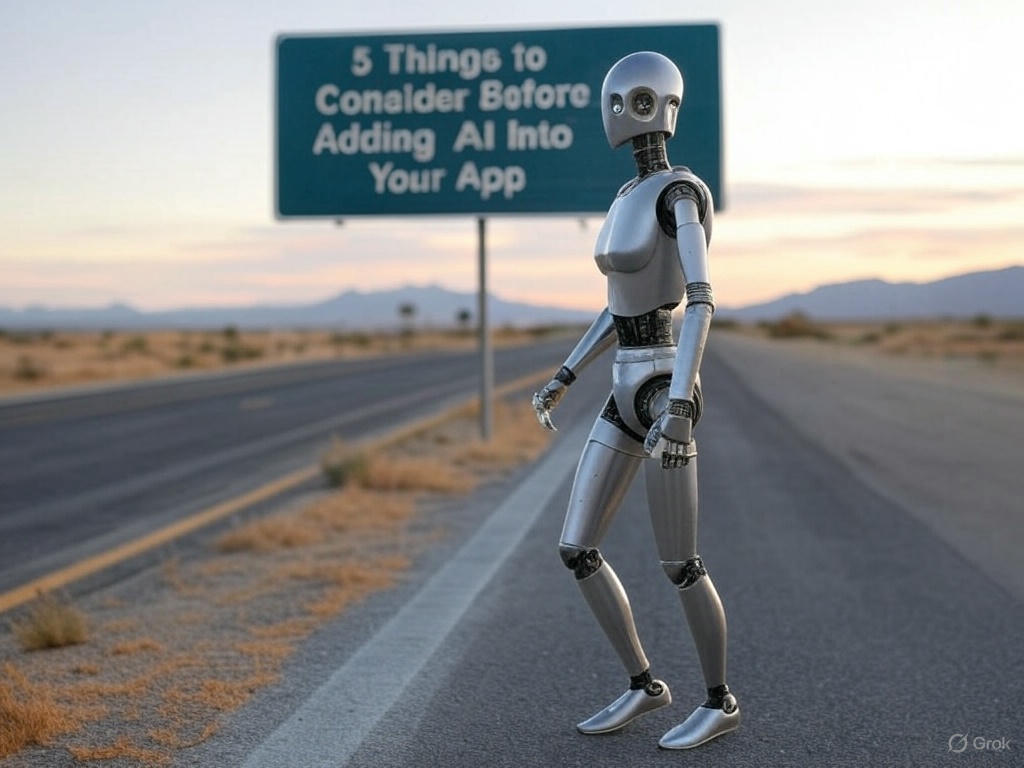Monday, November 13, 2023
-
3
min
The AI Revolution - How Artificial Intelligence Is Reshaping the Process of App Development
Artificial intelligence (AI) is no longer a futuristic idea but a tangible force reshaping industries and our interactions with technology. App development, a pivotal element of this digital revolution, is experiencing a profound transformation through AI.
AI is becoming the driving force behind the next generation of applications. Traditional, labour-intensive coding tasks no longer bind developers; instead, they harness AI to automate, optimise, and innovate.
In this blog post, Chatty Garrate explores how AI is streamlining the development process, empowering developers with new tools, and ultimately changing how we interact with and benefit from mobile and web applications.
See how Morrow used AI for app development in our recent Open AI Hackathon 2.0.
AI in App Development
AI functions by simulating human intelligence through algorithms and data analysis. When applied to app development, it introduces significant changes. Developers can utilise AI for automated code generation, reducing the need for manual coding and minimising the chances of errors. That streamlines the development process, making it more efficient.
AI-driven tools enhance testing and debugging by identifying and rectifying bugs and vulnerabilities. This saves time and results in more reliable and secure applications. AI's ability to analyse user behaviour and preferences leads to personalised user experiences. Tailoring content and features to individual users can boost engagement and retention.
Through predictive analytics, AI processes extensive datasets to provide insights into user trends. This data can be used to make informed decisions and adapt apps accordingly. The transformation is already happening and continues to advance. It is promising to reform the process of incorporating AI models in app development in the future.
But does the AI revolution mean the jobs of software developers are at stake? And can we trust AI for all app needs?
Will AI Replace App Developers?
In a recent study, researchers explored the capabilities of AI-powered chatbots, like ChatGPT, in running a tech company efficiently and cost-effectively. These chatbots were assigned various roles and could communicate, make logical decisions, and resolve software issues. The study, conducted by Brown University and Chinese universities, established a hypothetical software development company named ChatDev, following a sequential approach: design, code, test, and document.
The AI bots, resembling a CEO, CTO, programmer, and art designer, worked together with minimal human intervention, completing software projects swiftly. Remarkably, ChatDev completed 70 tasks, on average, in under seven minutes, costing less than a dollar, with 86.66% of software systems executed flawlessly.
However, we can't agree that AI will replace humans. While the study emphasised AI's potential to aid programmers and engineers in real-world scenarios, it can't replace them, and we can identify limitations in the AI language models:
Understanding Nuances and User Experience
AI can be proficient at coding, but it often misses the mark when it comes to understanding the nuanced requirements of end-users. Human app developers can empathise with users, considering their experiences, preferences, and emotions, which leads to creating more user-centric applications.
Adaptation to Unforeseen Challenges
No matter how advanced, AI chatbots can't anticipate or adapt to unforeseen challenges or sudden changes in project requirements. Human developers can pivot, brainstorm solutions, and quickly adapt to evolving project needs.
Ethical and Moral Considerations
AI doesn't possess moral or ethical compasses. Human developers can weigh ethical implications and consider the broader societal consequences of their work, a responsibility that AI lacks. This human oversight is crucial, especially when developing software directly impacts people's lives. It's also essential for ensuring compliance with industry standards such as SOC 2 Type 2, which verifies that a company's information security practices meet rigorous criteria.
Oversight and Accountability
Human developers are accountable for the software they create. They can be responsible for errors, security breaches, or other issues. Conversely, AI lacks personal accountability, making it challenging to assign responsibility when something goes wrong.
Best AI Tools to Use for App Development
Here's a discussion of some of the best AI tools that can be highly beneficial for app development:
ChatGPT
Use Case: ChatGPT, developed by OpenAI, is an exceptional tool for generating natural language text. It can be used in app development for chatbots, virtual assistants, and automated customer support.
Advantages: ChatGPT can understand and generate human-like text, making it an ideal choice for enhancing user interactions and providing real-time responses.
Google's ML Kit
Use Case: Google's ML Kit is a powerful mobile SDK for Android and iOS, making integrating machine learning models into mobile apps easier.
Advantages: It offers a wide range of pre-trained models for text recognition, face detection, image labelling, and more. It simplifies the implementation of AI features in mobile apps.
Dialogflow

Use Case: Dialogflow, by Google, is designed for building conversational interfaces, such as chatbots and voice-controlled apps.
Advantages: It provides natural language understanding, enabling developers to create conversational applications that understand and respond to user inputs.
AWS AI Services
Use Case: Amazon Web Services (AWS) offers a suite of AI services that cover areas like computer vision, speech recognition, and language understanding.
Advantages: You can integrate this service into your app to add features like image analysis, voice commands, and chatbot capabilities.
H2O.ai
Use Case: H2O.ai offers AI and machine learning platforms that can be used for predictive analytics and data-driven decision-making in applications.
Advantages: It's an excellent choice for apps that require data analysis, predictive modelling, and anomaly detection.
While AI can't replace human developers entirely, it can play a significant role as a catalyst in the software development process. AI can handle repetitive, time-consuming tasks, accelerate coding processes, and detect bugs. That allows human developers to focus on higher-level tasks like strategic planning, problem-solving, and creating innovative solutions.
Partner with Morrow to transform your Expo app into a high-performing, secure, and user-friendly solution. Fill out our Expo audit form and take the first step towards app excellence.
Liked this blog post? Subscribe to our monthly newsletter to never miss an article.




.jpg)









